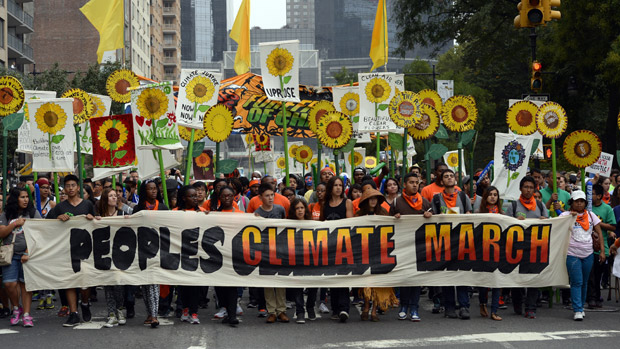Climate change marches: hundreds of thousands demand action
Protesters including politicians and celebrities warn climate change is 'biggest threat humanity has faced'

A free daily email with the biggest news stories of the day – and the best features from TheWeek.com
You are now subscribed
Your newsletter sign-up was successful
Protests calling on leaders to take action on climate change have attracted hundreds of thousands of people at more than 2,000 locations worldwide.
The People's Climate March took place in 156 countries across the globe on the eve of the UN Climate Summit in New York, where the largest demonstration took place.
Over 310,000 people took to the streets of Manhattan, including environmental activists, celebrities such as actor Leonardo Di Caprio who was recently appointed as the UN's representative on climate change, and politicians including the UN Secretary General Ban ki Moon and Al Gore.
The Week
Escape your echo chamber. Get the facts behind the news, plus analysis from multiple perspectives.

Sign up for The Week's Free Newsletters
From our morning news briefing to a weekly Good News Newsletter, get the best of The Week delivered directly to your inbox.
From our morning news briefing to a weekly Good News Newsletter, get the best of The Week delivered directly to your inbox.
"This is the planet where our subsequent generations will live," Ban Ki-Moon told the crowds. "There is no 'Plan B' because we don't have a 'Planet B'".
Archbishop Desmond Tutu accused government and industry leaders of putting "short-term economic and political goals ahead of our collective long-term survival."
US Secretary of State John Kerry said that the threat of climate change should be taken as seriously as that posed by Islamic State and Ebola, according to the Guardian. "There is a long list of important issues before all of us, but the grave threat that climate change poses warrants a prominent position on that list."
In London, over 40,000 people took to the streets, including actress Emma Thompson and fashion designer Vivienne Westwood. Thompson urged the crowds to come together and "use our power to tackle the biggest threat humanity has ever faced."
A free daily email with the biggest news stories of the day – and the best features from TheWeek.com
This week, the UN will host its climate summit, where 125 heads of state will meet to work towards creating a global agreement on climate change that will be signed by the end of 2015. Countries are expected to publicise their proposals on how they plan to cut the greenhouse gas emissions.
Ban Ki-Moon is hoping the latest round of talks will bring an end to the "blame-your-neighbour" attitude that prevails when global powers discuss climate change, writes the BBC's environment analyst Roger Harrabin. However, he warns that there is "no guarantee that Ban's idea will work" as "some big players may continue the game of climate poker, holding back their offers until they see what else is on the table."
Campaigners say they will continue to put pressure on politicians to act. Ben Phillips, Oxfam's campaign director, said: "If you ask the suffragettes, the civil rights movement or the India freedom movement just 10 years in, 20 years in, ‘what have you achieved?’, they’d say: ‘Well we’ll keep on fighting until we win’, and so will we."
-
 Quiz of The Week: 14 – 20 February
Quiz of The Week: 14 – 20 FebruaryQuiz Have you been paying attention to The Week’s news?
-
 The Week Unwrapped: Do the Freemasons have too much sway in the police force?
The Week Unwrapped: Do the Freemasons have too much sway in the police force?Podcast Plus, what does the growing popularity of prediction markets mean for the future? And why are UK film and TV workers struggling?
-
 Properties of the week: pretty thatched cottages
Properties of the week: pretty thatched cottagesThe Week Recommends Featuring homes in West Sussex, Dorset and Suffolk
-
 Epstein files topple law CEO, roil UK government
Epstein files topple law CEO, roil UK governmentSpeed Read Peter Mandelson, Britain’s former ambassador to the US, is caught up in the scandal
-
 Iran and US prepare to meet after skirmishes
Iran and US prepare to meet after skirmishesSpeed Read The incident comes amid heightened tensions in the Middle East
-
 Israel retrieves final hostage’s body from Gaza
Israel retrieves final hostage’s body from GazaSpeed Read The 24-year-old police officer was killed during the initial Hamas attack
-
 China’s Xi targets top general in growing purge
China’s Xi targets top general in growing purgeSpeed Read Zhang Youxia is being investigated over ‘grave violations’ of the law
-
 Panama and Canada are negotiating over a crucial copper mine
Panama and Canada are negotiating over a crucial copper mineIn the Spotlight Panama is set to make a final decision on the mine this summer
-
 Why Greenland’s natural resources are nearly impossible to mine
Why Greenland’s natural resources are nearly impossible to mineThe Explainer The country’s natural landscape makes the task extremely difficult
-
 Iran cuts internet as protests escalate
Iran cuts internet as protests escalateSpeed Reada Government buildings across the country have been set on fire
-
 US nabs ‘shadow’ tanker claimed by Russia
US nabs ‘shadow’ tanker claimed by RussiaSpeed Read The ship was one of two vessels seized by the US military